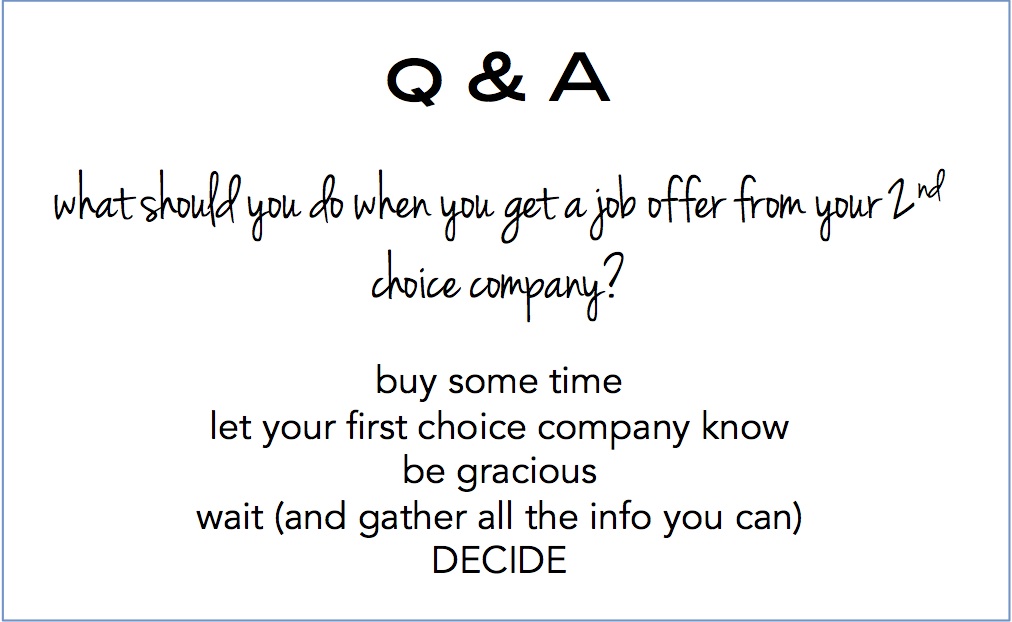I know the title of this article is a bit wordy, but here’s the situation: You’ve been looking for a job and interviewing with lots of different companies for different roles. In your mind, you have a 1st choice, 2nd choice, 3rd choice and so on… but you really need a job. The situation is that you get a job offer from your 2nd choice company (or 3rd, 4th, 5th).
How should you handle it?
When you’re in the interviewing process, different companies will move at different paces, so this is a common occurrence. Knowing that you may still have a shot with your first choice company, it’s tough to figure out how to respond to the other offer.
There are a few steps to handling this situation.

Step 1. Communicate with the company that gave you the offer & let them know you need some time
The first thing you’ll need to do is buy a little time. Taking time to think about an offer is perfectly acceptable. However, you can’t just ask for infinite time as the company who gave you the offer does have an immediate need that they are trying to fill. They won’t be able to wait around forever. I think a week is the maximum amount of time you can ask for before you risk looking like you’re not at all interested.
Also as you ask for this, make sure you are really gracious and appreciative of the offer and the time they’ve put in to getting to know you/interviewing you. You definitely don’t want to go from being super warm to very cold the instant they extend an offer to you.
Step 2. Contact your first choice company and let them know you have another offer
People definitely are hesitant to make this phone call and feel uncomfortable about it, but actually, recruiters are used to dealing with this type of thing. They know (unless you’ve explicitly told them otherwise) that you are probably interviewing with others and that’s okay! You have to take this opportunity to bring your first choice company in the loop so they have the ability to change course based on the new information.
Here’s an example: Your first choice company may be a week or two away from being able to give you an offer but they are feeling really good about you as a candidate. If you let them know that you’re going to have to make a decision more quickly (based on the other offer), they may be able to expedite the process. If you don’t share this information with them, you will never have an opportunity to know how it would have played out.
So please, don’t be afraid to communicate!
When you write this type of email or make this type of call, here’s what you want to get across:
- you’re really excited about their company and they are your number one choice
- however, you have another offer that you need to make a decision on
- you need to make this decision by x date
- you’d like to know how much information they can give you on your candidacy and next steps
- (that’s pretty much it!)
Step 3. Make sure your first choice company knows they’re your first choice
When you tell the company about your other offer, make sure they know where they stand. If they don’t think there’s a chance of you taking their offer, there’s no point to them rushing around trying to make it happen on an expedited schedule. So make sure they know they’re your number one choice and that you are still really excited to join their team even though you have another offer on the table.
Step 4. Wait (but not too long)
Hopefully sharing this information with your number one choice company will get you some clarity on what the process will look like from here and how good your chances are of getting an offer. However, you never know how much clarity you are going to get and when you’re going to get it. It can be anywhere from “we just don’t have any additional information right now” to “we really want you to come on board and we’re going to do our best to get you an answer in the next few days”. You’ll have to give them at least a few days to get some more clarity.
Step 5. Decide
Whether you have complete or incomplete information, you’re still going to have to make a decision which might be tough. I would encourage you to think about the offer is on the table and ask yourself, “will I be happy there?”, “will I be able to learn a lot”, and all of the other questions you may ask yourself when thinking about accepting an offer.
At the end of the day you also have to ask yourself “how much do I need a job?” and that can be a very real decision factor… because sometimes you can’t hold out any longer.
While I can’t advise you on what the right decision is, I can say that you will have to make one. Like I said before, you can’t expect your second choice company to just wait around. They’re going to need to know your decision.
Again, while this can be a stressful situation, remember the silver lining. You have a job offer! It’s also good to remember that this is a situation that recruiters deal with pretty often. Don’t be afraid to be transparent, keep interested companies in the loop on your decision process and timeline, and gather the most imformation you possibly can.
Then, you’ll be ready to make your decision.





